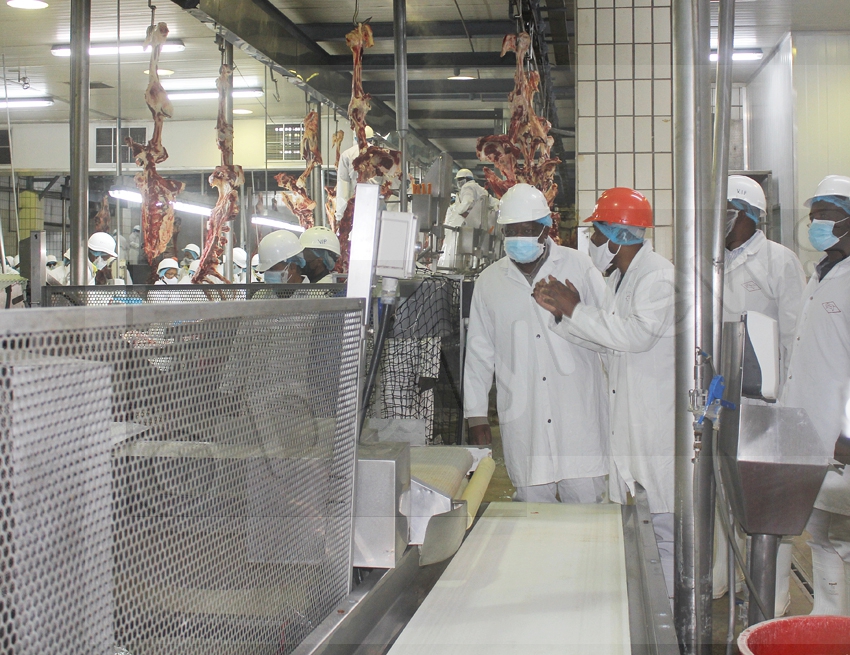Botswana lacks capacity to investigate dangerous material
01 Feb 2022
Botswana does not have adequate capacity and capability to detect chemical, biological, nuclear and radiological materials. It is for this reason that it has become necessary to amend the Biological and Toxin Weapons (Prohibition) ACT of 2018, Defence, Justice and Security minister Mr Kagiso Mmusi said when presenting a bill to amend the act before Parliament Monday.
Minister Mmusi said as a response to the challenge government established the Department of Chemical, Biological, Nuclear and Radiological Weapons Management (CBNRM) in 2018.
Mr Mmusi it was important that the Biological and Toxin Weapons Act aligned with the Counter Terrorism act, which was the aim of the bill. The minister said CBNRM was currently doing a skills audit of all laboratories in the country, inventory and quantity management checks, as well as risk assessment with a view to adopting and maintaining appropriate measures to account for and insure the safety, security and physical protection of CBNR related materials.
However, he said, expertise in the field was scarce and approving the bill was critical, as it would help to capacitate structures to effectively investigate and detect the toxin materials, he said.
Mr Mmusi said the country would submit its first ever confidence-building measures to the Biological Weapons Convention as a way to preventing or reducing occurrence of ambiguities, doubts and suspicions and to improve international cooperation.
Commenting on the bill, Nata/Gweta Member of Parliament, Mr Polson Majaga said biological and toxin weapons were a result on technological advancement and globalisation, and easily accessible.
He said it was therefore important to align the laws to the changes.Mr Majaga said the country must guard against security threats likely to be brought by biological and toxin weapons.
He said terrorism was a challenge to world economy, and therefore, the country must come up with laws to ensure that it was not a haven for terrorists.
Nkange MP, Dr Never Tshabang said the bill was necessary for the prevention of proliferation of biological weapons and toxins.
Dr Tshabang said there was concern over safety and security of facilities such as National Research Laboratories and those at Universities. He said they were porous enough to allow access to criminals with a mind to produce biological and toxin weapons. Dr Tshabang said biological substances and chemicals at schools were likely to be used as biological weapons.
He said expired biological substances were allowed to remain on shelves for a long time and there was no proper disposal, and were not only a danger but could potentially be used by criminals.
Even though it was necessary to apply restrictions on such substances, Dr Tshabang said there was need to strike a balance to avoid stifling the good work of the innocent and valuable aspect of research as well as capacity building among scientist.
Palapye MP, Mr Onneetse Ramogapi stressed the importance of regulating use of chemicals.
Mr Ramogapi said there was a need to build capacity to investigate and prosecute intentional misuse of chemicals with the motive to commit crime. Mr Ramogapi said focus must be on controlled use and disposal of biological and toxin chemicals, adding that waste from such weapons had detrimental effects on the environment and its inhabitants. Tati East Legislator, Dr Douglas Letsholathebe said biological and toxin weapons were used for mass destruction. Dr Letsholathebe said biological and toxin chemicals produced bacteria and viruses, used as weapons of war resulting in diseases and death.
Even though most of them may not cause sudden death, they spread with ease and therefore ultimately caused serious damage to health and the environment.
He said they were not restricted by boundaries, as some were airborne. Dr Letsholathebe said the 1972, Biological Weapons Convention agreed to end use of such weapons as they would likely destroy mankind.
He said biological and toxin weapons were a threat to the tourism sector as they could cause damage to the ecosystem and also a challenge to food security. ENDS
Source : BOPA
Author : Moshe Galeragwe
Location : Parliament
Event : Parliament
Date : 01 Feb 2022



